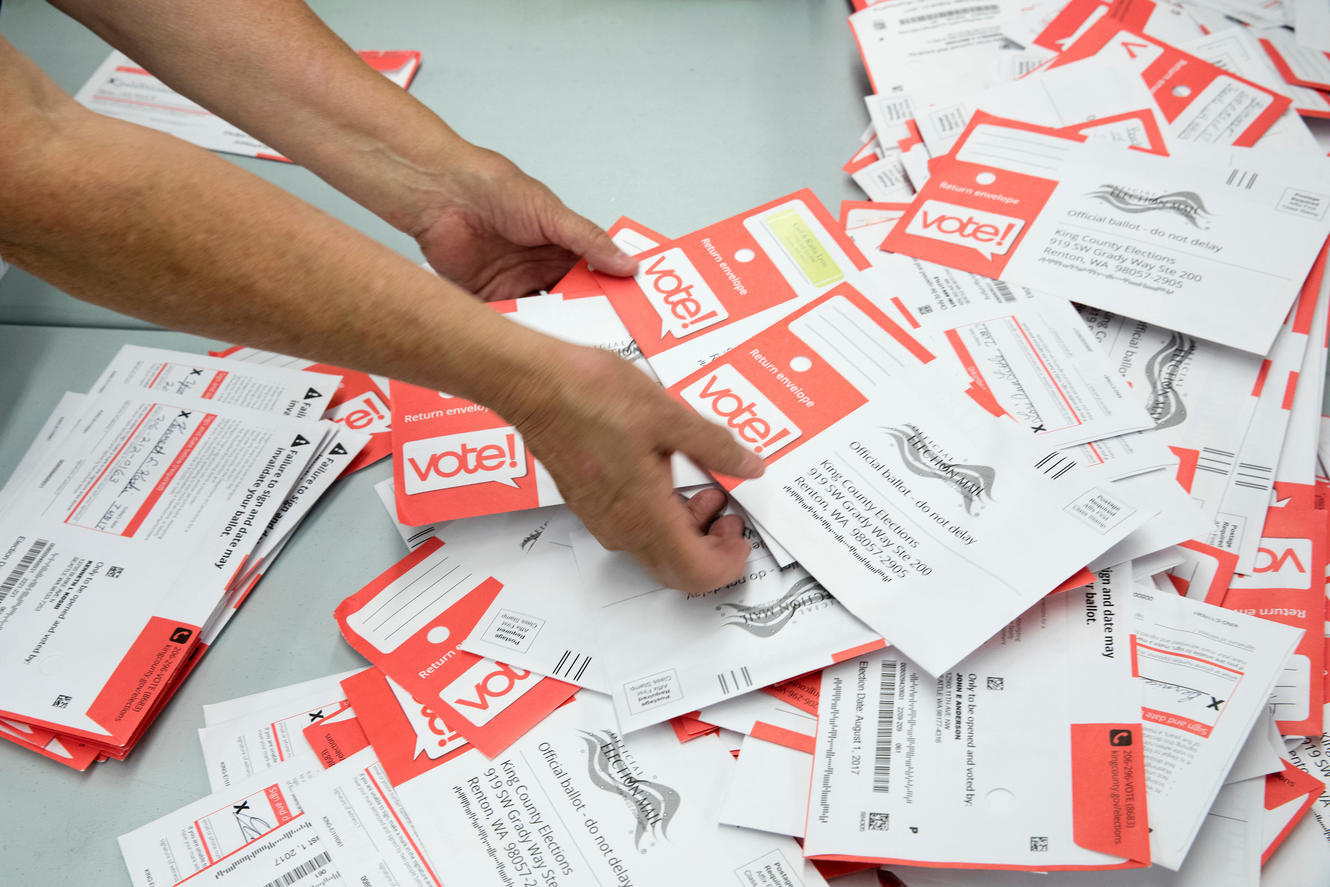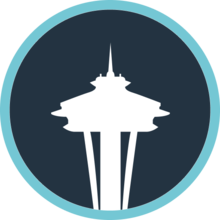Get the latest in election news
In the weeks leading up to each election (and occasionally during the legislative session), Crosscut's Election newsletter will provide you with everything you need to know about races, candidates and policy in WA state.
FAQs & Voting 101
For this voter guide, we recommend checking out the King County elections website.
For other elections, check out the secretary of state's website. It's the best place to see who is running in races in your city or county. You can also check on the progress of ballot initiatives.
Many Washington state races, including those in Seattle and King County, are nonpartisan. That means candidates are not required to run under any party label, though they may choose to promote themselves under one.
Washington voters can register up to the day of the election. You can register online or through the mail by Oct. 25. Registration forms are available in many languages, from Amharic to Vietnamese. To register online, you need a current Washington state driver’s license or permit or a state identification card. If you do not have one of those cards, you can still register by mail or in person. The state will even help you find your county elections office, which is where you will likely need to go to register and vote in person between Oct. 25 and Election Day on Nov. 2.
If you are registered to vote in Washington state and your address hasn’t changed, your ballot will be mailed to you about two weeks before the election. You can make sure your registration is up to date with your current address; check in here. If you did not receive a ballot, lost it or just made a mistake while filling it out, you can print a new one at your county elections office website. If you need a voter’s pamphlet, you can look at the guide at the same place where you check the status of your ballot.
In Washington, you do not need to request an absentee ballot, but other states have a variety of rules. This site will help you figure out how to sign up for an absentee ballot if you do not live in Washington.
Every county has drop boxes where you can turn in your ballot. The Office of the Secretary of State keeps this list of box locations. You can drop your ballot in one of these boxes until 8 p.m. on Election Day. Your ballot can also be mailed, without a stamp, and will be considered valid if it’s postmarked by Election Day.
Registered voters will receive their ballots around Oct. 15. You can register to vote online and through the mail until Oct. 25, but Washington also allows same-day registration, in person, up to and including Election Day, at your county elections office. If you’re not sure if you’re registered, check in here.
If you are going to be in another state or another country when Washington ballots are mailed and you won't be returning until after the election, you have several options. If you are going to be staying with a friend or family member in another state, change your mailing address in VoteWA.gov to your temporary address. While you are away, you can also print a "replacement" ballot from the same website and mail it by following the directions on that document.
The instructions for military members and overseas voters are slightly more complicated. Military members and their spouses can vote by mail, fax or email.
Lawmakers considered a bill earlier in 2021 that would have allowed local municipalities to experiment with ranked-choice voting, which would allow voters to choose their top candidate and rank others in order of preference so that if their first choice loses, their vote is given to another person.
According to FairVote, an organization advocating for election reform, while no municipalities in Washington employ ranked-choice voting, the approach was used in 22 paces as of June 2021, from Oregon and California to Minnesota. Dozens of other municipalities are considering changing their voting system to move toward ranked-choice voting.
This is how it works: After the election, all first choice votes are counted. If a candidate has over 50% of the vote, that candidate wins. If no candidate meets that threshold, the candidate with the fewest votes is eliminated. The voters whose first choice is eliminated will have their votes count toward their second choice candidate. The process continues until a candidate has over 50% of the vote.
A bill on ranked-choice voting made it part of the way through the Washington House in 2021, with lots of debate and amendments proposed, but it did not survive to a floor vote. Proposals usually require numerous legislative sessions before progressing toward a vote in one house or the other.
In 2004, Washington changed its primary ballot system to advance the two people with the most votes into the general election, regardless of party affiliation, instead of having voters choose their top candidates on a primary ballot just for their chosen party. That can result — and often does — in two candidates from the same party competing in the November election.
Washington’s primary system was challenged in the courts and eventually received the blessing of the U.S. Supreme Court in 2008.
When Washington voters approved the top-two primary system, the Democratic, Republican and Libertarian parties all challenged the new law, saying the U.S. Constitution gives Americans the right to affiliate with a political party of their choice. The parties said the law violates their right to pick the candidates for office and that someone who calls themselves a Democrat, for example, but doesn’t fit their ideals, could earn a place in the general election and force the party to support that candidate. The Supreme Court justices disagreed and sided with the voters. They even ordered the parties to repay the state for court costs.
Writing for the 7-2 majority, Justice Clarence Thomas said that overturning Washington’s primary initiative would have been an “extraordinary and precipitous nullification of the will of the people.”
The top-two primary system is the reason why in Washington elections for partisan offices on the ballot say the candidate “prefers the Republican Party” instead of just “is” a Republican.
Seattle became the first U.S. city to approve "democracy vouchers" as a way of public financing of political campaigns in 2015. Supporters say the idea democratizes political campaigns by giving regular folks money to contribute as they choose, presumably taking some power away from rich people, companies and organizations that seem to dominate campaign finance.
You do not get a new batch of democracy vouchers for the general election, but if you didn’t use yours in the primary election, you can still “spend” them during the general election. As the city’s election site explains, you have until Nov. 30 (yes, weeks after the election) to give your vouchers to a campaign.
If you can’t find your vouchers and don’t think you already gave them away, you can access them online. First check your voter registration to make sure it is up to date. If it is, you have the option to access the democracy voucher system online and “spend” your vouchers through the site. If you can find the vouchers in your mail pile, you can still mail them in or hand them directly to a candidate or campaign staffer. (The city does check the vouchers when they’re submitted, so you won’t be able to spend your vouchers twice.) A voter can spend all four $25 vouchers on one candidate or donate them to multiple candidates they support.
Candidates eligible to receive vouchers are listed on the participating candidates' page. Candidates are allowed to ask for your vouchers in the same way they might solicit other kinds of campaign contributions, including at in-person town halls or when they knock on your door during campaigning.
Local and county elections are happening all over Washington state this fall. You can see a list of all the races on the Washington Secretary of State website and also on your county elections site.
In general, in odd-number years, Washington voters decide on local races and initiatives. In even-number years, they vote on state legislative races and Congress. Every four years, in even-number years, voters also decide on statewide races, including the governor, attorney general and secretary of state, as well as the president of the United States.
Sometimes these offices are decided out of order, because someone has died or quit, but this year, there are no special elections for the Legislature, Congress or statewide office.
Here’s a story politics reporter Melissa Santos wrote about the Tacoma mayoral election.
If you're curious about how this Washington and the District of Columbia intersect on election laws, read this story by Melissa Santos. Many key provisions of the federal For the People Act, which is still under consideration by Congress, are already law in Washington state, including the widespread use of mail-in voting, easily traceable paper ballots and same-day voter registration.
Who is involved in this round of election reporting at Crosscut?
News and politics editor Donna Gordon Blankinship and reporters David Kroman and Melissa Santos.
The questions we asked candidates came from you, the voters.
When we debuted Crosscut’s Seattle and King County Voter Guide ahead of the August primary, we wanted local voters at the heart of it. That’s why we asked you for your questions about housing and homelessness, policing, public safety, taxes and urban planning, which we sent directly to the candidates who are seeking your vote.
After Seattle and King County voters narrowed the choices, Crosscut’s audience engagement team collected a second round of reader questions for candidates running for Seattle mayor, city council and city attorney. More than 200 people sent in their suggestions and we picked the most popular questions and themes and passed them along to the candidates. Their answers are featured in the issues section of this voter guide.
While we can’t tell you who to vote for, we want to get you the information you need to decide which candidate best aligns with your values.
Methodology
Who is involved in this round of election reporting at Crosscut?
News and politics editor Donna Gordon Blankinship and reporters David Kroman and Melissa Santos.
The questions we asked candidates came from you, the voters.
When we debuted Crosscut’s Seattle and King County Voter Guide ahead of the August primary, we wanted local voters at the heart of it. That’s why we asked you for your questions about housing and homelessness, policing, public safety, taxes and urban planning, which we sent directly to the candidates who are seeking your vote.
After Seattle and King County voters narrowed the choices, Crosscut’s audience engagement team collected a second round of reader questions for candidates running for Seattle mayor, city council and city attorney. More than 200 people sent in their suggestions and we picked the most popular questions and themes and passed them along to the candidates. Their answers are featured in the issues section of this voter guide.
While we can’t tell you who to vote for, we want to get you the information you need to decide which candidate best aligns with your values.








